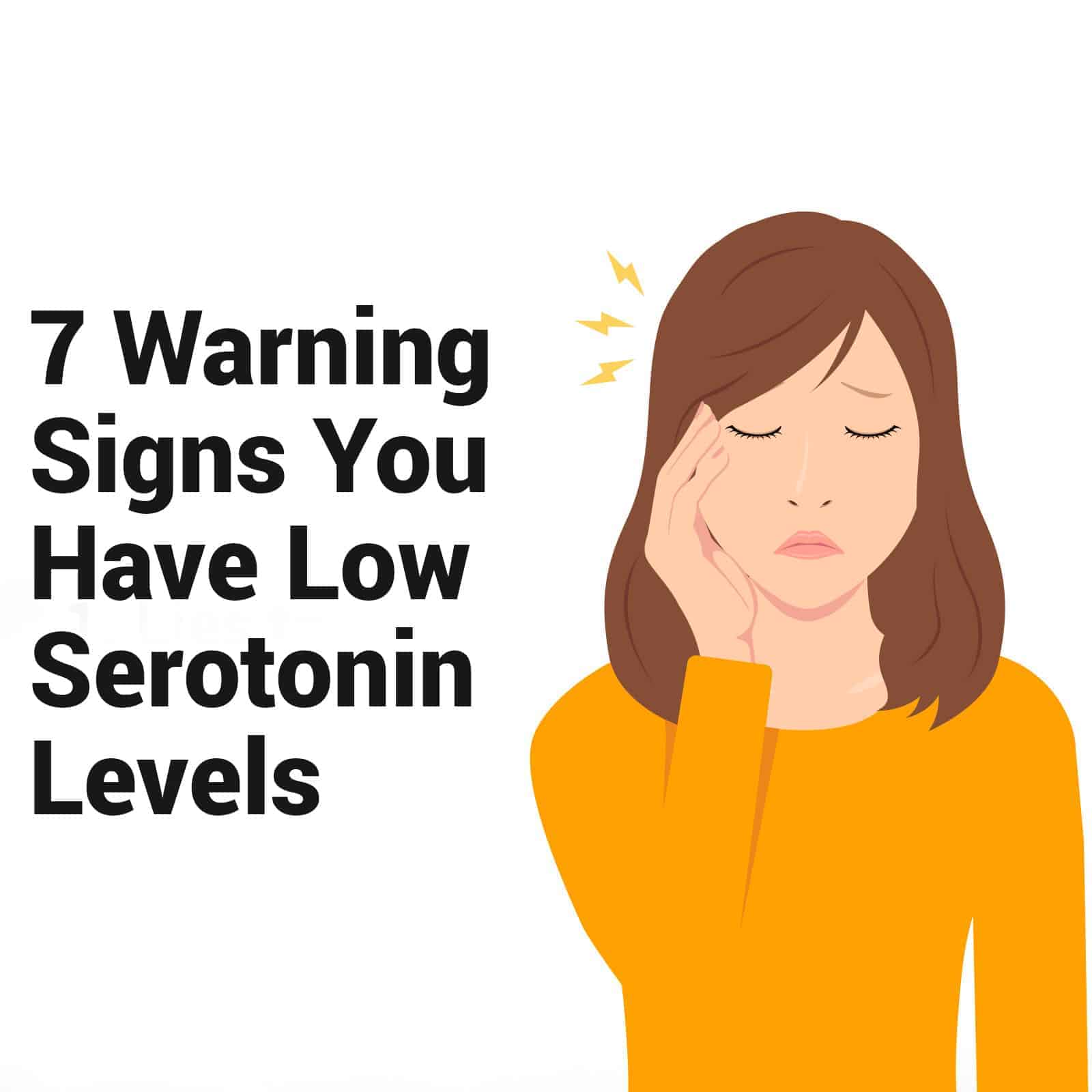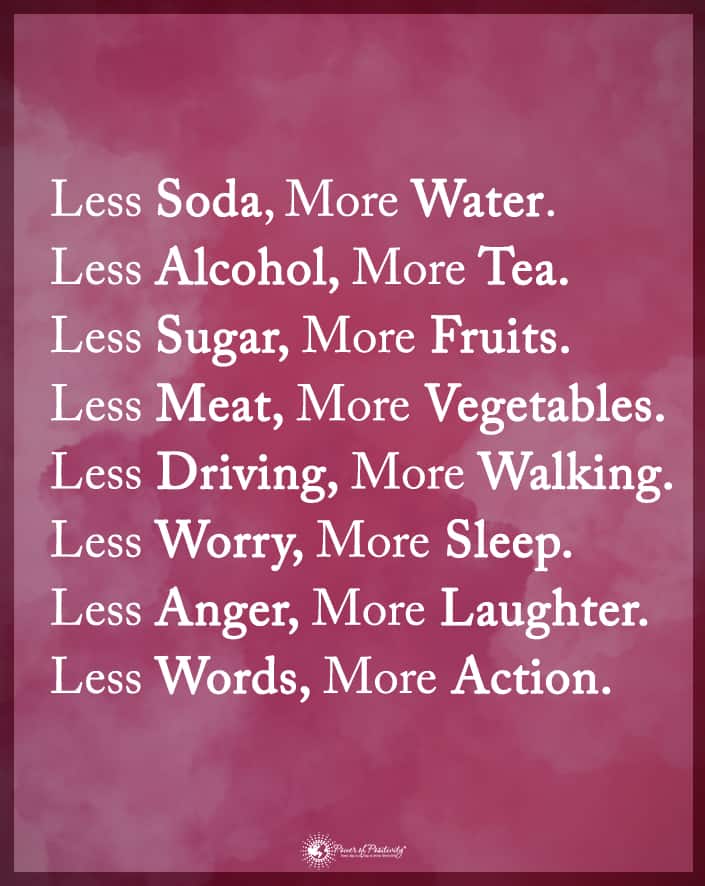Serotonin is not only responsible for mood but appetite, pain reception, digestion, and sleep. While the term “serotonin levels” is most frequently mentioned along with depression and anxiety, low serotonin levels can result in many different symptoms and side effects.
Most people don’t particularly know – nor care to understand – the functionalities and importance of neurotransmitters. That is, of course, until they or someone they’re close to is impacted by some disorder potentially caused by the abnormal neurotransmitter activity.
The fact is that the brain’s neurotransmitters are primarily part of what makes us…well…us. These brain chemicals are wholly responsible for the myriad communications in our brain and body. In the brain, neurotransmitters relay neuronal signals that allow it to operate correctly.
Here are seven warning signs of low serotonin levels:
Serotonin is an inhibitory neurotransmitter…adequate amounts of serotonin are necessary for a stable mood and to balance any excessive excitatory neurotransmitter firing in the brain…serotonin also regulates many other processes such as carbohydrate cravings, sleep cycle, pain control and appropriate digestion. Low serotonin levels are also associated with decreases immune system function. – Neurogistics.com
1. Craving sweet and starchy food
Carbohydrates, such as sweet and starchy foods, can indirectly impact serotonin levels. It is common for those with low levels to yearn for foods that are rich in carbs.
When the body ingests carbohydrates, more tryptophan – an essential building block of serotonin – becomes available. In turn, the brain and body produce more serotonin. Furthermore, many foods high in carbohydrates contain gluten, which is also addictive.
2. Cognitive impairment
Serotonin is an essential chemical for normal cognitive function. Research has demonstrated that proper neurotransmitter levels improve mental ability and may help correct defective cognitive functioning.
While many believe that it plays a role in overall thinking abilities, its most significant impact is on memory. Those with low serotonin levels are more likely to have problems with memory consolidation.
3. Anxiety
Medications that boost levels are commonly prescribed to people suffering from anxiety. Brain imaging has shown that those with high anxiety have limited serotonin in areas of the brain responsible for impulse and emotional control.
It is worth noting that three other neurotransmitters, gamma-aminobutyric acid (GABA), dopamine, and epinephrine, also play a part in anxiety disorders.
4. Fatigue or Exhaustion
Serotonin levels have a marked effect on energy production. Some people who experience chronic fatigue undergo testing for insufficient amounts of the chemical. However, when they replenish, they go from fatigue to noticing a drastic improvement in energy levels.
As with many of the symptoms described in this article, feeling tired or exhausted can result from many different conditions. Chronic (long-term) fatigue increases the possibility of low serotonin in the brain.
5. Digestive trouble
It is an essential chemical for relaying signals between the brain and digestive system. Medical professionals have discovered a link between irritable bowel syndrome (IBS) and inadequate serotonin levels.
As demonstrated with IBS patients, digestive processes often resume normalized functionality when such deficiencies are corrected.
6. Insomnia
The amount of serotonin available also directly affects the production of melatonin. When serotonin levels are low, the ability to produce melatonin is impaired. As part of a domino effect, the circadian rhythm – an essential element of the sleep/wake cycle – is off-kilter.
When this happens, it is complicated for someone to follow a natural sleep/wake pattern. Specifically, the ability to fall and remain asleep is often negatively affected.
8. Libido changes
Among its many properties is serotonin’s effect on libido (sex drive). Low levels are directly linked to an increased desire to have sex but a diminished ability to connect emotionally or bond – not a good recipe for intimacy.
Further, fluctuations in serotonin levels, whether in production or reduction, can impact one’s attitude, not to mention physical capabilities, concerning sexual activity.
Seven Simple Ways To Boost Serotonin Naturally
Despite insistence from the medical community that prescription medications are the best way to increase and stabilize serotonin levels, there are numerous other ways that this chemical can be produced – without the nasty side effects of pharmaceuticals.
• Get Some Sunlight
Without sunlight, your body wouldn’t be able to produce serotonin, making it critical for your survival. Many people with depression don’t make enough serotonin, and a lack of sunlight may contribute to this. When you go outside, sunlight hits your eyes and signals your brain to produce the neurotransmitter serotonin. This hormone helps boost your mood, regulate appetite, stimulate digestion and maintain a regular sleep-wake cycle.
So, serotonin doesn’t just help you wake up in the morning; it also contributes to feelings of sleepiness later in the day. Your body requires serotonin to produce melatonin, the hormone that promotes sleep. When you don’t get enough sunlight, your circadian rhythm becomes imbalanced, making it more difficult to fall asleep at night. It also can cause daytime drowsiness, irritability, depression, and other problems associated with poor sleep.
Make sure to get at least fifteen minutes of sunshine at sunrise and sunset to regulate your serotonin and melatonin production.
• Exercise or meditate (or both!)
It’s well-documented that exercise can boost feel-good hormones due to the release of endorphins. Studies have shown that exercise helps reduce anxiety and depression because of an increase in two precursors of serotonin – tryptophan, and 5-HIAA. Scientists also found that exertion triggers increases in the firing rates of serotonin neurons, therefore stimulating the release of serotonin.
After an intense workout, most people report feeling a “runner’s high” because of this flood of neurotransmitters. So, if you want to increase your serotonin, aim for moderate or vigorous exercise at least three to four times per week. Stick with something you enjoy so that you will look forward to the workouts!
Meditation can also enhance serotonin production because it lowers stress and anxiety, putting the mind in deep relaxation. Several studies performed on participants following their meditation sessions found an increase in serotonin in the urine. One study of Transcendental Meditation practitioners observed higher levels of serotonin before and after participants’ meditation sessions when compared to the control group.
Many studies prove the benefits of meditation, as practiced throughout the world for thousands of years. All you need to do is sit quietly, surrender, and be present. Focus on your breath and let go of the world. All you’ll start to remember is your true self beyond the phenomenal world.
• Eat carb and protein-rich foods.
Our diet plays a significant role in our mental and physical health. Certain foods have high levels of tryptophan, which gets converted into serotonin in the body. Make sure to add the following foods to your grocery list if you want to increase serotonin through your diet:
- bananas
- beans
- chia seeds
- dark green leafy vegetables
- eggs
- fruits
- lentils
- nuts and seeds
- oats
- pumpkin
- salmon
- tempeh
- tofu
- tuna
- turkey
Since about 90% of the body’s serotonin is made in the gut, it’s crucial to maintain a healthy diet. By eating a balanced diet with fresh, whole foods, your body should naturally produce adequate amounts of serotonin.
• Buy serotonin supplements (tryptophan, for example)
If you have a hard time eating tons of fresh foods, you can supplement with tryptophan. Called L-tryptophan, this essential amino acid is a precursor to serotonin and helps regulate mood. One study found that healthy individuals supplementing with tryptophan had a noticeable decrease in anxiety levels. They also had a more positive mindset after taking the supplement.
• Get a massage
Massages instantly relax the body and mind, especially if you get a deep tissue massage. One study found that massage therapy decreased cortisol levels by 31% while increasing serotonin by 28%. In addition, dopamine levels increased by 31%, suggesting that regular massages can positively affect stress.
• Take some B-vitamins (Supplements with a “B-complex” formula are ideal)
B vitamins such as B6 and 12 help the body convert tryptophan into serotonin. A healthy, balanced diet usually provides all the necessary B vitamins. But, if you have trouble getting enough, a B-complex vitamin can help fill in the gaps. Interestingly, many people with depression have low levels of B12 and folic acid, both essential vitamins for regulating moods.
• Get some 5-HTP (also a beneficial treatment for hypertension, depression, fibromyalgia, insomnia, and anxiety)
5-HTP is another amino acid that converts into serotonin in the body. Experts usually recommend 5-HTP over tryptophan because it crosses the blood-brain barrier more easily. Also, it converts to serotonin more efficiently and has a more significant antidepressant effect.
Adults need to take 50-100 mg two times per day. Note that if you take antidepressants or other psychiatric medications, you shouldn’t take 5-HTP or other supplements that increase serotonin. This can cause a dangerous condition called serotonin syndrome, where the body produces too much serotonin.
There are many ways to boost serotonin levels naturally, and it may be beneficial to consult with either a medical or holistic/natural health professional. Despite their side effects, prescription drugs may be the answer for some. Although, trying one (or more!) of these natural serotonin boosters may do the trick.
As a bonus, laugh with friends and family as often as possible. Laughing helps release feel-good hormones such as serotonin, making life more bearable. We take life far too seriously nowadays, so perhaps doctors should start prescribing laughter to their patients! After all, they say laughter is the best medicine for a reason.
Also, stick to a sleep schedule since sleep deprivation can cause a negative mood and increase depressive symptoms. As long as you take care of your health, you shouldn’t have a problem producing enough serotonin.
Final Thoughts on Natural Ways to Boost Serotonin Levels
Today, many people struggle with getting enough serotonin due to our unnatural ways of living. Humans require ample sunlight, fresh foods, relaxation, and exercise to feel our best. It isn’t easy to acquire all of these facets of health when we work inside most of the day. However, we can still learn to adapt and take care of our bodies despite difficult living conditions.
Patterning our sleep-wake cycles with the sun and moon can help restore our serotonin levels. Also, eating a balanced diet full of protein and complex carbs, meditating, exercising, and taking supplements can increase serotonin. It does take a bit of extra work to maintain our health nowadays, but you can start with one thing at a time.
Begin by taking supplements, as this doesn’t take much time out of your day, and you can manage it easily. Then, try waking up with the sun and walking a few times per week. Before you know it, you’ll start feeling more vibrant and cheerful due to the extra serotonin.


















